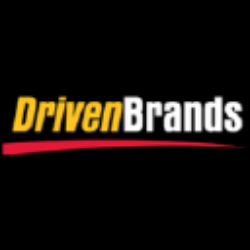FMP

Driven Brands Holdings Inc.
DRVN
NASDAQ
Driven Brands Holdings Inc., together with its subsidiaries, provides automotive services to retail and commercial customers in the United States, Canada, and internationally. The company offers various services, such as paint, collision, glass, vehicle repair, car wash, oil change, and maintenance services. It also distributes automotive parts, including radiators, air conditioning components, and exhaust products to automotive repair shops, auto parts stores, body shops, and other auto repair outlets; windshields and glass accessories through a network of distribution centers; and consumable products, such as oil filters and wiper blades, as well as provides training services to repair and maintenance, and paint and collision shops. The company sells its products and services under the Take 5 Oil Change, IMO, CARSTAR, ABRA, Fix Auto, Maaco, Meineke, Uniban, 1-800-Radiator & A/C, PH Vitres D'Autos, Spire Supply, and Automotive Training Institute names. As of December 25, 2021, it operated 4,412 company-operated, franchised, and independently-operated stores. Driven Brands Holdings Inc. was founded in 1972 and is headquartered in Charlotte, North Carolina.
16.12 USD
0.08 (0.496%)
Operating Data
Year
2020
2021
2022
2023
2024
2025
2026
2027
2028
2029
Revenue
20.34M
15.6M
23.19M
79.86M
82.11M
108.42M
143.17M
189.06M
249.65M
329.66M
Revenue %
-
-23.3
48.68
244.31
2.81
32.05
32.05
32.05
32.05
Ebitda
-53.61M
53.29M
-35.12M
1.03M
-8.56M
-23.66M
-31.25M
-41.26M
-54.49M
-71.95M
Ebitda %
-263.61
341.63
-151.41
1.3
-10.43
-21.83
-21.83
-21.83
-21.83
Ebit
-54.24M
52.64M
-42.62M
-20.55M
-29.85M
-35.15M
-46.41M
-61.29M
-80.93M
-106.86M
Ebit %
-266.67
337.44
-183.74
-25.73
-36.35
-32.42
-32.42
-32.42
-32.42
Depreciation
622k
653k
7.5M
21.59M
21.28M
20.07M
26.5M
34.99M
46.2M
61.01M
Depreciation %
3.06
4.19
32.34
27.03
25.92
18.51
18.51
18.51
18.51
EBIT (Operating profit)(Operating income)(Operating earning) = GROSS MARGIN (REVENUE - COGS) - OPERATING EXPENSES (R&D, RENT) EBIT = (1*) (2*) -> operating process (leverage -> interest -> EBT -> tax -> net Income) EBITDA = GROSS MARGIN (REVENUE - COGS) - OPERATING EXPENSES (R&D, RENT) + Depreciation + amortization EBITA = (1*) (2*) (3*) (4*) company's CURRENT operating profitability (i.e., how much profit it makes with its present assets and its operations on the products it produces and sells, as well as providing a proxy for cash flow) -> performance of a company (1*) discounting the effects of interest payments from different forms of financing (by ignoring interest payments), (2*) political jurisdictions (by ignoring tax), collections of assets (by ignoring depreciation of assets), and different takeover histories (by ignoring amortization often stemming from goodwill) (3*) collections of assets (by ignoring depreciation of assets) (4*) different takeover histories (by ignoring amortization often stemming from goodwill)